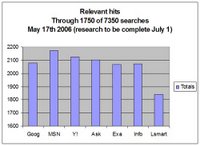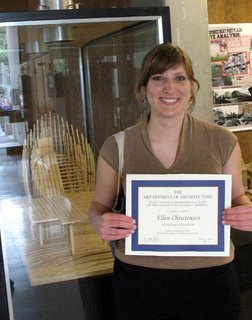Saturday, May 27, 2006
Security Risks and Search Engines
Another test (see below for a test of relevancy of search results), this time for security of resulting links. Interestingly, this test yields the same order of results for the big four as the other one: MSN is safest, then Yahoo, Ask, and -- again pulling up the rear -- Google.
Relevancy of Search Engine Results Compared
 This chart is a summary of results of a test performed by Intralink. Of the big three search engines, Google ranked third for producing relevant results.
This chart is a summary of results of a test performed by Intralink. Of the big three search engines, Google ranked third for producing relevant results.
Friday, May 26, 2006
Hey!
Hey, come on, somebody notice my new Yi jing. It's damn fine for divination -- give it a try.
Taking my own advice, about this the Yi jing sez (hexagram 4): "Don't go searching for the fool: he will find you. Asking once is fine; further questions yield nothing."
So ... never mind. Forget I mentioned it.
Thanks, Yi jing.
Taking my own advice, about this the Yi jing sez (hexagram 4): "Don't go searching for the fool: he will find you. Asking once is fine; further questions yield nothing."
So ... never mind. Forget I mentioned it.
Thanks, Yi jing.
Thursday, May 25, 2006
Wednesday, May 24, 2006
Page ranks of historical figures
How would Google rank the web pages of Emily Dickinson, William Shakespeare, Carolus Linneaus, Leonardo da Vinci, Niccolo Machievelli, and the Buddha? Rightreading reveals the page ranks of historical figures.
Tuesday, May 23, 2006
Link rot
Link rot is the tendency of links to go bad over time. This can happen pretty quickly, and I've been attacking it tonight. I found a good tool, Xenu's Link Sleuth, a no-frills link analyzer. It's small and simple. I like it better than the couple of others I've tried.
I've also taken down my old links pages (so 1990s!) and instead I'm migrating my links over to del.icio.us. I have a tagroll on my website as a visual aid and a link to them.
In a study at the University of Nebraska researchers found that "42.5 percent of dot-com addresses were lost since the study began."
By the way, researchers might benefit from using webcite. It's a free service that creates a snapshot of the citing webpages, similar to the wayback machine. I haven't used it, but it sounds like it could be useful.
To help combat link rot, when pages move the new location should be referenced with a redirect. And webmasters need to take responsibility for checking their links from time to time. Surfers could help by informing webmasters when they find bad links.
I hope the links in this post are still good by the time you read it!
I've also taken down my old links pages (so 1990s!) and instead I'm migrating my links over to del.icio.us. I have a tagroll on my website as a visual aid and a link to them.
In a study at the University of Nebraska researchers found that "42.5 percent of dot-com addresses were lost since the study began."
By the way, researchers might benefit from using webcite. It's a free service that creates a snapshot of the citing webpages, similar to the wayback machine. I haven't used it, but it sounds like it could be useful.
To help combat link rot, when pages move the new location should be referenced with a redirect. And webmasters need to take responsibility for checking their links from time to time. Surfers could help by informing webmasters when they find bad links.
I hope the links in this post are still good by the time you read it!
Monday, May 22, 2006
New photo posted at rightreading.com
The millions of regular readers of rightreading.com probably know that I have begun posting featured photos on my photography page. Latest up is a photo of the central garden at the Getty Center.
Speaking of the GC, I've been preparing a new batch of photos of the Getty and will post them to my travel section soon.
Over the years I've experimented with various ways of handling web photo albums, with the result that the presentation of these is inconsistent. I think I'm ready to standardize now (with a bit of tweaking) on a style like the one I used for bouquets to art.
Speaking of the GC, I've been preparing a new batch of photos of the Getty and will post them to my travel section soon.
Over the years I've experimented with various ways of handling web photo albums, with the result that the presentation of these is inconsistent. I think I'm ready to standardize now (with a bit of tweaking) on a style like the one I used for bouquets to art.
Sunday, May 21, 2006
Congratulations, Ellen
 Congratulations to Ellen Christensen, winner of the William Stout Prize in Architectural History, offered for the best architectural history paper written at the University of California-Berkeley during the current year. Papers are submitted for the award by the department’s GSIs (graduate student instructors) and then refereed by an outside committee. This year there were around twenty papers that made the pool of finalists.
Congratulations to Ellen Christensen, winner of the William Stout Prize in Architectural History, offered for the best architectural history paper written at the University of California-Berkeley during the current year. Papers are submitted for the award by the department’s GSIs (graduate student instructors) and then refereed by an outside committee. This year there were around twenty papers that made the pool of finalists.So Ellen, what do you think about this unexpected honor?
Ellen (surprised): But ... it’s not even my major!
Two more pictures follow.
Thursday, May 11, 2006
Wednesday, May 10, 2006
Google Trends
Google announced a new product today, Google Trends.
Google Trends tracks popularity over time by region and language of search terms entered in Google.
A few preliminary results are interesting:
* Firefox has leveled off since rising rapidly throughout 2004. It is especially popular in Germany
* Del.icio.us peaked at the end of 2005 but may be recovering. It's especially popular in Southeast Asia.
Result timelines may include landmarks dates: For example:
You can also compare trends. For example:
Yahoo consistly scores higher than Google (because searchers are already at Google?).
Japanese art consistently scores higher than Chinese art (but interest in both is declining, if search queries are an indication).
Google Trends tracks popularity over time by region and language of search terms entered in Google.
A few preliminary results are interesting:
* Firefox has leveled off since rising rapidly throughout 2004. It is especially popular in Germany
* Del.icio.us peaked at the end of 2005 but may be recovering. It's especially popular in Southeast Asia.
Result timelines may include landmarks dates: For example:
A After 125 years, ukulele still keeps 'em smiling
Arizona Republic - Apr 21 2004
B Hawaiian musician takes ukulele to stardom
KVUE (subscription) - Aug 26 2004
C Warren Buffett plays ukulele, answers tough questions in packed Berkshire weekend
San Diego Union Tribune - May 2 2005
D Hawaiian ukulele star rockets up charts
Wilkes Barre Times-Leader - Jun 13 2005
E Ukulele shop grew into historic status
Honolulu Star-Bulletin - Jul 17 2005
F Ukulele kids rock in class and after school, travelling the world to perform
Brandon Sun - Feb 18 2006
You can also compare trends. For example:
Yahoo consistly scores higher than Google (because searchers are already at Google?).
Japanese art consistently scores higher than Chinese art (but interest in both is declining, if search queries are an indication).
Saturday, May 06, 2006
Attention, Hit Sluts
1. Obsessed with the number of hits your website is getting? Check out McDar's Google Watch Tool. It allows you to compare results from most of Google's data centers.
2. What's up with Google anyway? Webmasters are reporting weird results all over the net. This thread covers the subject pretty thoroughly. (You don't have to log in, just click on "passed url.") It seems to me that Google is doing spring cleaning. I hope so, because my old site, webs.lanset.com/bookfolk, which has been defunct for almost a year, still ranks higher on some things that my current site, www.rightreading.com, even though the content is often identical at the new site.
3. THIS IS COOL: What kind of a tree would you be? Check out this remarkable visual representation of the spidering mechanisms of Google, Yahoo, and MSNSearch.
2. What's up with Google anyway? Webmasters are reporting weird results all over the net. This thread covers the subject pretty thoroughly. (You don't have to log in, just click on "passed url.") It seems to me that Google is doing spring cleaning. I hope so, because my old site, webs.lanset.com/bookfolk, which has been defunct for almost a year, still ranks higher on some things that my current site, www.rightreading.com, even though the content is often identical at the new site.
3. THIS IS COOL: What kind of a tree would you be? Check out this remarkable visual representation of the spidering mechanisms of Google, Yahoo, and MSNSearch.
Monday, May 01, 2006
Visions of Geekery
When you start to dream about SEO (search engine optimization) stuff, you know you’ve gone over the line. Besides, most of the techniques that used to work get you penalized now. For my money, Google Blogoscoped is the most entertaining search engine blog (although Google these days is about a lot more than searching). SEO Chat's Google Dance Tool will tell you when the techtonic plates of Google’s ratings start to shift. And at XSEO you can see the history of such changes. (For more, see this introduction to search engines.)
Subscribe to:
Comments (Atom)


